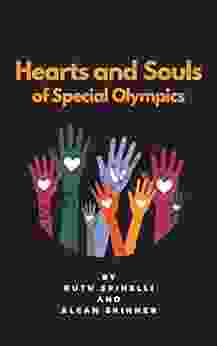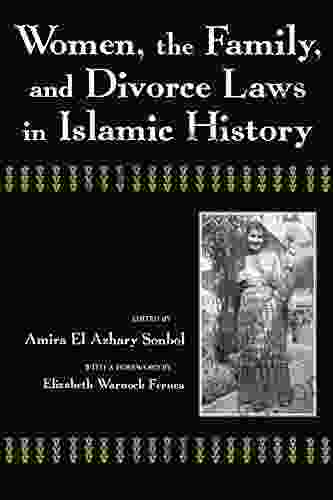Women, the Family, and Divorce Laws in Islamic History: Contemporary Issues

5 out of 5
| Language | : | English |
| File size | : | 1625 KB |
| Text-to-Speech | : | Enabled |
| Screen Reader | : | Supported |
| Enhanced typesetting | : | Enabled |
| Print length | : | 375 pages |
Throughout Islamic history, the rights and roles of women, the structure of the family, and the laws governing divorce have been subject to ongoing debate and evolution. From the early days of Islam to the present day, these issues have been shaped by a complex interplay of religious teachings, cultural norms, and social change.
In this article, we will explore the complex and evolving nature of women's rights, family structures, and divorce laws in Islamic history. We will examine contemporary issues and debates surrounding these topics, and discuss the challenges and opportunities for promoting gender equality and legal reform in Muslim societies.
Women's Rights in Islamic History
The Quran, the holy book of Islam, contains numerous verses that address the rights and responsibilities of women. These verses have been interpreted and applied differently throughout history, leading to diverse interpretations of women's roles within the family and society.
Some verses emphasize women's equality with men, such as the verse that states: "And for women are rights over men similar to those of men over women" (2:228). Other verses, however, have been used to justify practices that limit women's rights, such as the verse that states: "Men are in charge of women, because Allah hath made the one of them to excel the other, and because they spend of their property (for the support of women)" (4:34).
Throughout Islamic history, women's rights have been influenced by both religious and cultural factors. In some societies, women have enjoyed a relatively high degree of autonomy and equality, while in others they have faced significant restrictions.
In the early centuries of Islam, women were active participants in public life. They could own property, engage in trade, and seek education. However, over time, gender roles became more rigidly defined, and women's opportunities outside the home became more limited.
In many Muslim societies today, women face challenges in accessing education, employment, and political participation. They are also often subjected to discrimination and violence.
Family Structure in Islamic History
The family is a central institution in Islamic society. The Quran emphasizes the importance of family ties, and the Prophet Muhammad (ﷺ) described the family as "the foundation of Islam."
The traditional Islamic family structure is patriarchal, with the husband as the head of the household. The wife is responsible for managing the home and raising the children. However, this model is not always followed in practice, and there is considerable variation in family structures across different Muslim societies.
In some Muslim societies, extended families are common, with multiple generations living under one roof. In other societies, nuclear families are more prevalent. The size and structure of families can be influenced by a variety of factors, including economic conditions, cultural norms, and religious beliefs.
In recent decades, there have been significant changes in family structures in Muslim societies. Urbanization, industrialization, and increased educational opportunities for women have all contributed to a decline in the extended family model and an increase in nuclear families.
These changes have also led to greater diversity in family relationships. In some Muslim societies, women are now more likely to have careers outside the home, and men are more likely to share in household responsibilities.
Divorce Laws in Islamic History
Divorce is permitted in Islam, but it is discouraged. The Quran states that "divorce is hateful to Allah" (2:228). However, it also provides clear guidelines for the process of divorce, including the rights and responsibilities of both spouses.
Under Islamic law, a man can divorce his wife by simply pronouncing the words "I divorce you" three times. However, a woman cannot divorce her husband without his consent. She must either obtain a divorce through the courts or convince her husband to pronounce the words of divorce.
In some Muslim societies, women face significant challenges in obtaining a divorce. They may be subjected to pressure from their families or communities to remain in an unhappy marriage. They may also face financial or legal barriers to divorce.
In recent years, there have been calls for reform of divorce laws in Muslim societies. Some reformers argue that women should be given the same right to divorce as men. Others argue that the process of divorce should be made more equitable and less adversarial.
Contemporary Issues
The issues of women's rights, family structure, and divorce laws in Islamic history continue to be debated today. These issues are complex and multifaceted, and there is no easy way to resolve them.
One of the key challenges is to find ways to balance the principles of Islam with the evolving needs of Muslim societies. Another challenge is to address the cultural practices that discriminate against women and limit their rights.
Despite the challenges, there are also signs of progress. In recent decades, there have been significant advances in women's education and employment in Muslim societies. There have also been positive developments in the area of legal reform, with some Muslim countries enacting laws to protect women's rights and make divorce more equitable.
The future of women's rights, family structure, and divorce laws in Islamic history is uncertain. However, there is reason to be optimistic. The ongoing debates and reforms in these areas suggest that there is a growing awareness of the need for change. With continued dialogue and cooperation, it is possible to create more just and equitable societies for all Muslims.
The rights and roles of women, the structure of the family, and the laws governing divorce have been subject to ongoing debate and evolution throughout Islamic history. These issues are complex and multifaceted, and there is no easy way to resolve them.
However, there is reason to be optimistic about the future. The ongoing debates and reforms in these areas suggest that there is a growing awareness of the need for change. With continued dialogue and cooperation, it is possible to create more just and equitable societies for all Muslims.
References
- Ahmed, Leila. Women and Gender in Islam: Historical Roots of a Modern Debate. Yale University Press, 1992.
- An-Na'im, Abdullahi Ahmed. "Women, War, and Peace in Islam." International Journal of Peace Studies, vol. 4, no. 1, 1999, pp. 3-22.
- Barlas, Asma. Beyond Faith and Family: Women of Islam. Kazi Publications, 2002.
- Hasan, Zoya. Gender and Islamic Law: A Critical . Oneworld Publications, 2013.
- Moghadam, Valentine M. "Gender and Social Change in the Middle East: Modernization, Islam, and Cultural Transformation." Westview Press, 1993.
Image Credits
- Image 1: Public domain
- Image 2: Public domain
- Image 3: Public domain
5 out of 5
| Language | : | English |
| File size | : | 1625 KB |
| Text-to-Speech | : | Enabled |
| Screen Reader | : | Supported |
| Enhanced typesetting | : | Enabled |
| Print length | : | 375 pages |
Do you want to contribute by writing guest posts on this blog?
Please contact us and send us a resume of previous articles that you have written.
 Book
Book Novel
Novel Page
Page Chapter
Chapter Text
Text Story
Story Genre
Genre Reader
Reader Library
Library Paperback
Paperback E-book
E-book Magazine
Magazine Newspaper
Newspaper Paragraph
Paragraph Sentence
Sentence Bookmark
Bookmark Shelf
Shelf Glossary
Glossary Bibliography
Bibliography Foreword
Foreword Preface
Preface Synopsis
Synopsis Annotation
Annotation Footnote
Footnote Manuscript
Manuscript Scroll
Scroll Codex
Codex Tome
Tome Bestseller
Bestseller Classics
Classics Library card
Library card Narrative
Narrative Biography
Biography Autobiography
Autobiography Memoir
Memoir Reference
Reference Encyclopedia
Encyclopedia Ronda Rich
Ronda Rich Amber Locke
Amber Locke Amy Mayer
Amy Mayer Joan Bunning
Joan Bunning Michael Washam
Michael Washam Amber Flannery
Amber Flannery Patrick Cooper
Patrick Cooper Eric James Miller
Eric James Miller Andrea Karrer
Andrea Karrer Amby Cooper
Amby Cooper Steph Booth
Steph Booth Brad Schepp
Brad Schepp Anastasia Greywolf
Anastasia Greywolf Colin Griffith
Colin Griffith Shelby Sharp
Shelby Sharp Amber Hatch
Amber Hatch American Heart Association
American Heart Association Amy Sheppard
Amy Sheppard Nadia Kiwan
Nadia Kiwan Amy Thompson
Amy Thompson
Light bulbAdvertise smarter! Our strategic ad space ensures maximum exposure. Reserve your spot today!

 Jackson BlairUnveiling the Secrets: A Comprehensive Exploration of "The Order of Stone:...
Jackson BlairUnveiling the Secrets: A Comprehensive Exploration of "The Order of Stone:...
 Zachary CoxTroubleshooting with the Windows Sysinternals Tools: A Comprehensive Guide to...
Zachary CoxTroubleshooting with the Windows Sysinternals Tools: A Comprehensive Guide to... Devin CoxFollow ·3k
Devin CoxFollow ·3k Winston HayesFollow ·4k
Winston HayesFollow ·4k Davion PowellFollow ·13.2k
Davion PowellFollow ·13.2k Gordon CoxFollow ·12.4k
Gordon CoxFollow ·12.4k Justin BellFollow ·10.3k
Justin BellFollow ·10.3k Italo CalvinoFollow ·3.2k
Italo CalvinoFollow ·3.2k Casey BellFollow ·14k
Casey BellFollow ·14k David Foster WallaceFollow ·17.5k
David Foster WallaceFollow ·17.5k

 Miguel Nelson
Miguel NelsonFour Cookbooks In One: Recipes To Fight Cancer, Heart...
Looking for a healthy way...

 Marcus Bell
Marcus BellHearts and Souls: Exploring the Lives and Legacies of...
The Special Olympics movement has been a...

 Tony Carter
Tony CarterDiagnosed With Breast Cancer: Navigating Life After the...
A breast cancer diagnosis can be a...

 Joe Simmons
Joe SimmonsLiddypool: The Stories and Interviews – A Literary...
In the realm of...

 Jett Powell
Jett PowellBreakfast for Boneheads: 66 Breakfast Recipes for Lazy...
Are you tired of eating the...
5 out of 5
| Language | : | English |
| File size | : | 1625 KB |
| Text-to-Speech | : | Enabled |
| Screen Reader | : | Supported |
| Enhanced typesetting | : | Enabled |
| Print length | : | 375 pages |










